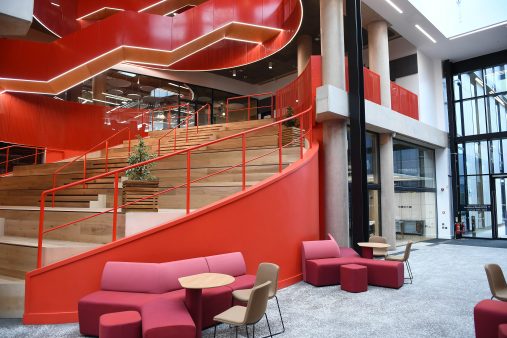SPARKing Wales’ future innovation strategy
21 March 2022
The Learned Society of Wales (LSW) is convening a programme of activities to help inform and improve innovation policies and practices in Wales. The role of science parks in innovation strategies is being considered as part of this programme and coincides with the launch of sbarc|spark and the world’s first Social Science Research Park (SPARK) on Cardiff Innovation Campus. Here, Professor Rick Delbridge, innovation special advisor to the LSW President, tells us more about recent findings.
 “This LSW programme is a timely for a number of reasons. At UK level, there is the publication of the BEIS Innovation Strategy, the Advanced Research and Invention Agency Bill, the increasing importance of a place-based agenda not least through the Levelling Up white paper, and UK Government’s spending review commitment to increase R&D spend by 35% to £20billion in the next 3 years.
“This LSW programme is a timely for a number of reasons. At UK level, there is the publication of the BEIS Innovation Strategy, the Advanced Research and Invention Agency Bill, the increasing importance of a place-based agenda not least through the Levelling Up white paper, and UK Government’s spending review commitment to increase R&D spend by 35% to £20billion in the next 3 years.
At the same time, Welsh Government is reviewing its innovation policies and is currently developing a new integrated cross-governmental strategy for innovation, and the TER Bill (Wales) will alter the landscape for research and innovation within HE.
Our LSW discussion in January re-iterated the place dependency of innovation, and the significant role that science parks can play in encouraging and facilitating this innovation whilst stimulating regional economic development. We heard from examples in north, west and south Wales, each with a distinctive offer. Areas keen to encourage innovation through science parks, however, must be able to offer an attractive place proposition to attract talent, capital, and innovative businesses.
There was consensus that without a strong place-based proposition, it was difficult to deliver innovation at scale. Reflecting on what might be distinctive about the offer of various innovation spaces in Wales, participants highlighted the potential to offer a better quality of life and a good work-life balance than some of the largest and most successful science parks elsewhere in the UK.
Combined with this, facilities such as modern well-designed buildings with office and lab spaces, appropriate technologies, and social spaces such as good cafes, combined with the collective vision of committed individuals and good overarching programme as a driving force, were said to offer the optimal conditions for successful outcomes”.
These findings coincide with the opening of sbarc|spark at the heart of the Innovation Campus at Cardiff University.
sbarc|spark brings together researchers, entrepreneurs, student start-ups and academic spinouts. Boasting the world’s first Social Science Research Park (SPARK), the state-of-the-art building was announced as Wales’ first Living Wage building in July 2021. All tenants – 800 at full capacity – will be obliged to pay at least the real Living Wage to employees and onsite contractors.
Professor Delbridge explains, “The building is designed by activity instead of department, using ‘activity-based working’, with the more private, secure spaces further away from the landmark Oculus staircase and the open plan / breakout zones at its heart.
Flexibility is at the heart of the vision. Activities within the building require very different environments – from quiet spaces for the behavioural lab to the buzzing public ground floor. The building needs to respond to this, whilst creating flexible, re-programmable floorplans.
Given the vital role of science parks in the innovation strategy of the regional and national economies of Wales, there was agreement at our roundtable that more could be done to orchestrate and collaborate across the science parks in the Welsh innovation ecosystem and the potential importance of a Welsh network and voice for the science parks here was also discussed.
We have previously highlighted the importance of Wales developing an ‘innovation narrative’ and the significance of such a narrative emerged in the discussion once again. This narrative needs to be grounded in current realities but convey our ambitions and aspirations as an innovation nation. The opportunities for innovation need to be expressed and understood as inclusive, something that has relevance to people, society and the economy.
Our mission for sbarc|spark is to do just that: lead by example with our UK-first project; share, promote and amplify stories, highlight great case studies of success, embed awareness of innovation and make it a big part of everyday life.”
Professor Rick Delbridge is former Dean of Research, Innovation and Enterprise at Cardiff University (2012-2019) and led the development of the Social Science Research Park (SPARK). He is co-author of the Nesta paper Social Science Parks – society’s new super-labs, co-convenor of the Centre for Innovation Policy Research, and co-author of the CIPR paper, Scoping the Future of Innovation Policy in Wales.
sbarc|spark opened on St David’s Day (1 March). For more information on working with us, email SPARK@cardiff.ac.uk
